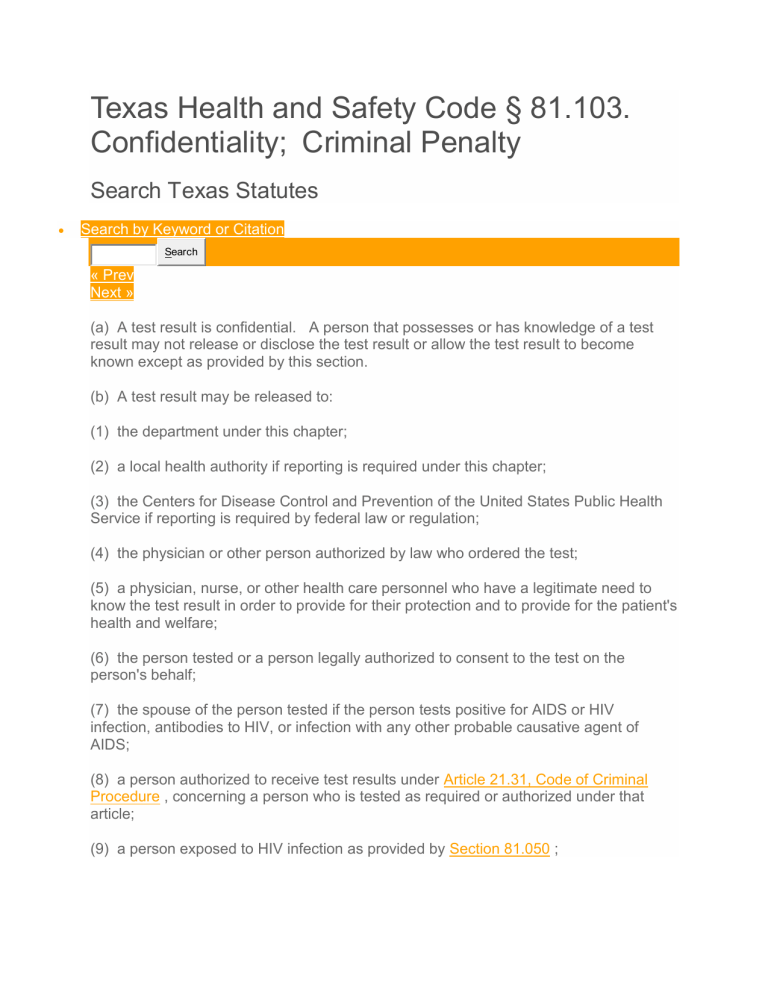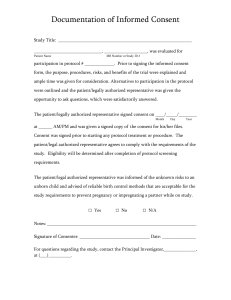
Texas Health and Safety Code § 81.103. Confidentiality; Criminal Penalty Search Texas Statutes Search by Keyword or Citation Search « Prev Next » (a) A test result is confidential. A person that possesses or has knowledge of a test result may not release or disclose the test result or allow the test result to become known except as provided by this section. (b) A test result may be released to: (1) the department under this chapter; (2) a local health authority if reporting is required under this chapter; (3) the Centers for Disease Control and Prevention of the United States Public Health Service if reporting is required by federal law or regulation; (4) the physician or other person authorized by law who ordered the test; (5) a physician, nurse, or other health care personnel who have a legitimate need to know the test result in order to provide for their protection and to provide for the patient's health and welfare; (6) the person tested or a person legally authorized to consent to the test on the person's behalf; (7) the spouse of the person tested if the person tests positive for AIDS or HIV infection, antibodies to HIV, or infection with any other probable causative agent of AIDS; (8) a person authorized to receive test results under Article 21.31, Code of Criminal Procedure , concerning a person who is tested as required or authorized under that article; (9) a person exposed to HIV infection as provided by Section 81.050 ; (10) a county or district court to comply with this chapter or rules relating to the control and treatment of communicable diseases and health conditions; and (11) a designated infection control officer of an affected emergency response employee or volunteer. (c) The court shall notify persons receiving test results under Subsection (b)(8) of the requirements of this section. (d) A person tested or a person legally authorized to consent to the test on the person's behalf may voluntarily release or disclose that person's test results to any other person, and may authorize the release or disclosure of the test results. An authorization under this subsection must be in writing and signed by the person tested or the person legally authorized to consent to the test on the person's behalf. The authorization must state the person or class of persons to whom the test results may be released or disclosed. (e) A person may release or disclose a test result for statistical summary purposes only without the written consent of the person tested if information that could identify the person is removed from the report. (f) A blood bank may report positive blood test results indicating the name of a donor with a possible infectious disease to other blood banks if the blood bank does not disclose the infectious disease that the donor has or is suspected of having. A report under this subsection is not a breach of any confidential relationship. (g) A blood bank may report blood test results to the hospitals where the blood was transfused, to the physician who transfused the infected blood, and to the recipient of the blood. A blood bank may also report blood test results for statistical purposes. A report under this subsection may not disclose the name of the donor or person tested or any information that could result in the disclosure of the donor's or person's name, including an address, social security number, a designated recipient, or replacement information. (h) A blood bank may provide blood samples to hospitals, laboratories, and other blood banks for additional, repetitive, or different testing. (i) An employee of a health care facility whose job requires the employee to deal with permanent medical records may view test results in the performance of the employee's duties under reasonable health care facility practices. The test results viewed are confidential under this chapter. (j) A person commits an offense if, with criminal negligence and in violation of this section, the person releases or discloses a test result or other information or allows a test result or other information to become known. An offense under this subsection is a Class A misdemeanor. (k) A judge of a county or district court may issue a protective order or take other action to limit disclosure of a test result obtained under this section before that information is entered into evidence or otherwise released in a court proceeding.
